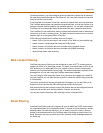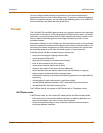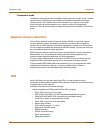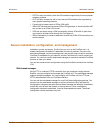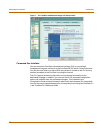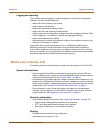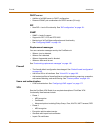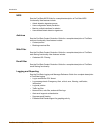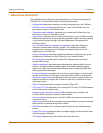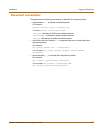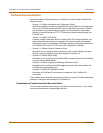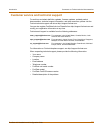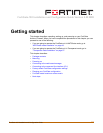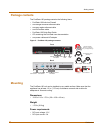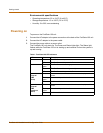
22 Fortinet Inc.
Logging and Reporting Introduction
About this document
This installation and configuration guide describes how to install and configure the
FortiGate-100. This document contains the following information:
• Getting started describes unpacking, mounting, and powering on the FortiGate.
• NAT/Route mode installation describes how to install the FortiGate if you are
planning on running it in NAT/Route mode.
• Transparent mode installation describes how to install the FortiGate if you are
planning on running it in Transparent mode.
• System status describes how to view the current status of your FortiGate unit and
related status procedures including installing updated FortiGate firmware, backing
up and restoring system settings, and switching between Transparent and
NAT/Route mode.
• Virus and attack definitions updates and registration describes configuring
automatic virus and attack definition updates. This chapter also contains
procedures for connecting to the FortiGate tech support webs site and for
registering your FortiGate unit.
• Network configuration describes configuring interfaces, configuring routing, and
configuring the FortiGate as a DHCP server for your internal network.
• RIP configuration describes the FortiGate RIP2 implementation and how to
configure RIP settings.
• System configuration describes system administration tasks available from the
System > Config web-based manager pages. This chapter describes setting
system time, adding and changed administrative users, configuring SNMP, and
editing replacement messages.
• Firewall configuration describes how to configure firewall policies to control traffic
through the FortiGate unit and apply content protection profiles to content traffic.
• Users and authentication describes how to add user names to the FortiGate user
database and how to configure the FortiGate to connect to a RADIUS server to
authenticate users.
• IPSec VPN describes how to configure FortiGate IPSec VPN.
• PPTP and L2TP VPN describes how to configure PPTP and L2TP VPNs between
the FortiGate and a windows client.
• Network Intrusion Detection System (NIDS) describes how to configure the
FortiGate NIDS to detect and prevent network attacks.
• Antivirus protection describes how use the FortiGate to protect your network from
viruses and worms.
• Web filtering describes how to configure web content filtering to prevent unwanted
Web content from passing through the FortiGate.
• Email filter describes how to configure email filtering to screen unwanted email
content.
• Logging and reporting describes how to configure logging and alert email to track
activity through the FortiGate.
•The Glossary defines many of the terms used in this document.



